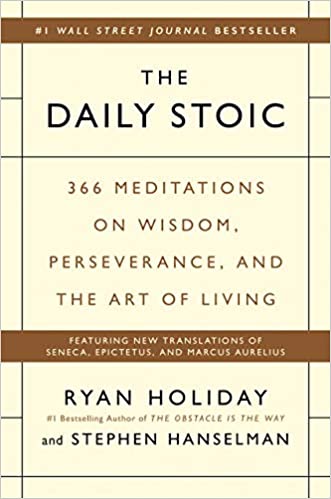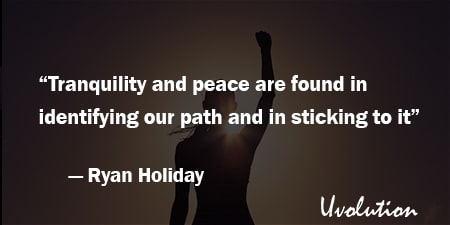The Daily Stoic by Ryan Holiday Book Summary
The Book in 1 Sentences
The Daily Stoic: 366 Meditations on Wisdom, Perseverance, and the Art of Living
“The private diaries of one of Rome’s great emperors, the personal letters of one of Rome’s best playwrights and wisest power brokers, the lectures of a former slave and exile, turned influential teacher. Against all the odds and the passing of some two millennia, these incredible documents survive.
What do they say? Could these ancient and obscure pages really contain anything relevant to modern life? The answer, as it turns out, is yes. They contain some of the greatest wisdom in the history of the world.
Together these documents constitute the bedrock of what is known as Stoicism, an ancient philosophy that was once one of the most popular civic disciplines in the West, practiced by the rich and the impoverished, the powerful and the struggling alike in the pursuit of the Good Life. But over the centuries, knowledge of this way of thinking, once essential to so many, slowly faded from view. ...
Our goal with this book is to restore Stoicism to its rightful place as a tool in the pursuit of self-mastery, perseverance, and wisdom: something one uses to live a great life, rather than some esoteric field of academic inquiry.” ~ Ryan Holiday & Stephen Hanselman
6 BIG Ideas
The Daily Stoic Book Summary
1. Focus on what you can control
“The single most important practice in Stoic philosophy is differentiating between what we can change and what we can’t. What we have influence over and what we do not. A flight is delayed because of weather—no amount of yelling at an airline representative will end a storm. No amount of wishing will make you taller or shorter or born in a different country.
No matter how hard you try, you can’t make someone like you. And on top of that, time spent hurling yourself at these immovable objects is time not spent on the things we can change.
The recovery community practices something called the Serenity Prayer: ‘God, grant me the serenity to accept the things I cannot change, the courage to change the things I can, and the wisdom to know the difference.’
Addicts cannot change the abuse suffered in childhood. They cannot undo the choices they have made or the hurt they have caused. But they can change the future—through the power they have in the present moment. As Epictetus said, they can control the choices they make right now.
The same is true for us today. If we can focus on making clear what parts of our day are within our control and what parts are not, we will not only be happier, we will have a distinct advantage over other people who fail to realize they are fighting an unwinnable battle.”
As Epictetus’s says: “The chief task in life is simply this: to identify and separate matters so that I can say clearly to myself which are externals not under my control, and which have to do with the choices I actually control. Where then do I look for good and evil? Not to uncontrollable externals, but within myself to the choices that are my own.”
“If there’s a central message of Stoic thought, it’s this: impulses of all kinds are going to come, and your work is to control them, like bringing a dog to heel. Put more simply: think before you act. Ask: Who is in control here? What principles are guiding me?”
2. Tranquility and Euthymia
“In Seneca’s essay on tranquility, he uses the Greek word, euthymia, which he defines as ‘believing in yourself and trusting that you are on the right path, and not being in doubt by following the myriad footpaths of those wandering in every direction.’ It is this state of mind, he says, that produces tranquility.
Clarity of vision allows us to have this belief. That’s not to say we’re always going to be 100 percent certain of everything, or that we even should be. Rather, it’s that we can rest assured we’re heading generally in the right direction—that we don’t need to constantly compare ourselves with other people or change our mind every three seconds based on new information.
Instead, tranquility and peace are found in identifying our path and in sticking to it: staying the course—making adjustments here and there, naturally—but ignoring the distracting sirens who beckon us to turn toward the rocks.”
As Seneca says: “Tranquility can’t be grasped except by those who have reached an unwavering and firm power of judgment—the rest constantly fall and rise in their decisions, wavering in a state of alternately rejecting and accepting things. What is the cause of this back and forth? It’s because nothing is clear and they rely on the most uncertain guide—common opinion.”
3. Practice: ‘I don’t care.’
“One of the most powerful things you can do as a human being in our hyperconnected, 24/7 media world is say: ‘I don’t know.’ Or, more provocatively: ‘I don’t care.’
Most of society seems to have taken it as a commandment that one must know about every single current event, watch every episode of every critically acclaimed television series, follow the news religiously, and present themselves to others as an informed and worldly individual.
But where is the evidence that this is actually necessary? Is the obligation enforced by the police? Or is it that you’re afraid of seeming silly at a dinner party? Yes, you owe it to your country and your family to know generally about events that may directly affect them, but that’s about all.
How much more time, energy, and pure brainpower would you have available if you drastically cut your media consumption? How much more rested and present would you feel if you were no longer excited and outraged by every scandal, breaking story, and potential crisis (many of which never come to pass anyway)?”
Seneca says: “We must give up many things to which we are addicted, considering them to be good. Otherwise, courage will vanish, which should continually test itself. Greatness of soul will be lost, which can’t stand out unless it disdains as petty what the mob regards as most desirable.”
4. What kind of boxer are you?
“The Stoics loved to use boxing and wrestling metaphors the way we use baseball and football analogies today. This is probably because the sport of pankration—literally, ‘all strength,’ but a purer form of mixed martial arts than one sees today in the UFC—was integral to boyhood and manhood in Greece and Rome. (In fact, recent analysis has found instances of ‘cauliflower ear,’ a common grappling injury, on Greek statues.) The Stoics refer to fighting because it’s what they knew.
Seneca writes that unbruised prosperity is weak and easy to defeat in the ring, but a ‘man who has been at constant feud with misfortunes acquires a skin calloused by suffering.’ This man, he says, fights all the way to the ground and never gives up.
That’s what Epictetus means too. What kind of boxer are you if you leave because you get hit?
That’s the nature of the sport! Is that going to stop you from continuing?”
Epictetus says: “But what is philosophy? Doesn’t it simply mean preparing ourselves for what may come? Don’t you understand that really amounts to saying that if I would so prepare myself to endure, then let anything happen that will?
Otherwise, it would be like the boxer exiting the ring because he took some punches. Actually, you can leave the ring without consequence, but what advantage would come from abandoning the pursuit of wisdom? So, what should each of us say to every trial we face? This is what I’ve trained for, for this my discipline!”
“Don’t you deserve to flourish? Wouldn’t you like to be great of soul, filled with confidence, and invincible to external events? ... Then practice your philosophy.”
Angela Duckworth - in her book Grit- says: “There’s an old Japanese saying: ‘Fall seven, rise eight.’ If I were ever to get a tattoo, I’d get these four simple words indelibly inked.”
5. How to live
“You have two essential tasks in life: to be a good person and to pursue the occupation that you love. Everything else is a waste of energy and a squandering of your potential.
How does one do that? OK, that’s a tougher question. But the philosophy we see from the Stoics makes it simple enough: say no to distractions, to destructive emotions, to outside pressure.
Ask yourself: What is it that only I can do? What is the best use of my limited time on this planet? Try to do the right thing when the situation calls for it. Treat other people the way you would hope to be treated. And understand that every small choice and tiny matter is an opportunity to practice these larger principles.
That’s it. That’s what goes into the most important skill of all: how to live.”
6. A love of fate
“Something happened that we wish had not. Which of these is easiest to change: our opinion or the event that is past?
The answer is obvious. Accept what happened and change your wish that it had not happened. Stoicism calls this the ‘art of acquiescence’—to accept rather than fight every little thing.
And the most practiced Stoics take it a step further. Instead of simply accepting what happens, they urge us to actually enjoy what has happened—whatever it is. Nietzsche, many centuries later, coined the perfect expression to capture this idea: amor fati (a love of fate). It’s not just accepting, it’s loving everything that happens.
To wish for what has happened to happen is a clever way to avoid disappointment because nothing is contrary to your desires. But to actually feel gratitude for what happens? To love it? That’s a recipe for happiness and joy.”
“Strength is the ability to maintain a hold of oneself. It’s being the person who never gets mad, who cannot be rattled, because they are in control of their passions—rather than controlled by their passions.”
Epictetus says: “What does Socrates say? ‘Just as one person delights in improving his farm, and another his horse, so I delight in attending to my own improvement day by day.’”
That was my QUICK summary of the great book The Daily Stoic by Ryan Holiday. If you’re interested, get your copy. There is a HUGE amount of life-changing ideas in this book, and we’ve only touched on a tiny bit of it.
Buy The Book: The Daily Stoic by Ryan Holiday

GET Blinkist 7 Days FREE Trial
3000+ Book Summaries
(Audio and Text)








